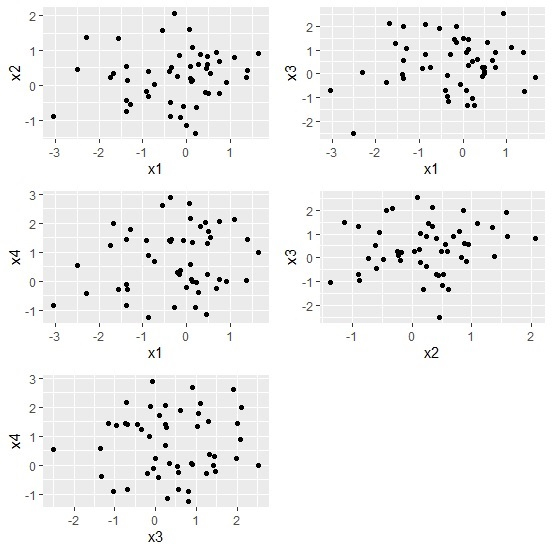如何在 R 中使用 grid.arrange 来排列散点图列表?
在预测建模中,我们在数据集中得到许多变量,并且我们希望一次可视化这些变量之间的关系。这有助于我们理解一个变量如何随另一个变量而变化,在此基础上我们能够使用更好的建模技术。为了创建图列表,我们可以在 gridExtra 包中使用 grid.arrange 函数,它可以根据我们的需要排列图。
示例
考虑以下数据帧 −
> set.seed(10) > df<-data.frame(x1=rnorm(10),x2=rnorm(20,0.2),x3=rnorm(20,0.5),x4=rnorm(10,0.5)) > head(df,20) x1 x2 x3 x4 1 0.01874617 1.301779503 -1.3537405 0.09936245 2 -0.18425254 0.955781508 0.4220539 0.16544343 3 -1.37133055 -0.038233556 1.4685663 1.86795395 4 -0.59916772 1.187444703 0.6849260 2.63776710 5 0.29454513 0.941390128 -0.8799436 1.00581926 6 0.38979430 0.289347266 -0.9355144 1.28634238 7 -1.20807618 -0.754943856 0.8620872 -0.40221194 8 -0.36367602 0.004849615 -1.2590868 1.03289699 9 -1.62667268 1.125521262 0.1754560 -0.14589425 10 -0.25647839 0.682978525 -0.1515630 0.79098749 11 0.01874617 -0.396310637 1.5865514 0.09936245 12 -0.18425254 -1.985286838 -0.2625449 0.16544343 13 -1.37133055 -0.474865938 -0.3286625 1.86795395 14 -0.59916772 -1.919061192 1.3344739 2.63776710 15 0.29454513 -1.065198022 -0.4676520 1.00581926 16 0.38979430 -0.173661555 0.4711847 1.28634238 17 -1.20807618 -0.487555430 0.7325252 -0.40221194 18 -0.36367602 -0.672158827 0.1987913 1.03289699 19 -1.62667268 0.098238994 -0.1776146 -0.14589425 20 -0.25647839 -0.053780530 1.1552276 0.79098749
加载 ggplot2 包 −
> library(ggplot2)
加载 gridExtra 包 −
> library(gridExtra)
在数据帧中不同变量的一些不同组合中创建散点图,这些变量为 (x1,x2)、(x1,x3)、(x1,x4)、(x2,x3)、(x3,x4) −
> plot1 <- ggplot(df, aes(x1,x2)) + geom_point() > plot2 <- ggplot(df, aes(x1,x3)) + geom_point() > plot3 <- ggplot(df, aes(x1,x4)) + geom_point() > plot4 <- ggplot(df, aes(x2,x3)) + geom_point() > plot5 <- ggplot(df, aes(x3,x4)) + geom_point()
创建图列表 −
> PlotsList<- list(plot1,plot2,plot3,plot4,plot5)
在一个图中排列图 −
> grid.arrange(grobs = PlotsList, ncol = 2)
输出


广告

 数据结构
数据结构 网络
网络 RDBMS
RDBMS 操作系统
操作系统 Java
Java iOS
iOS HTML
HTML CSS
CSS Android
Android Python
Python C 编程
C 编程 C++
C++ C#
C# MongoDB
MongoDB MySQL
MySQL JavaScript
JavaScript PHP
PHP